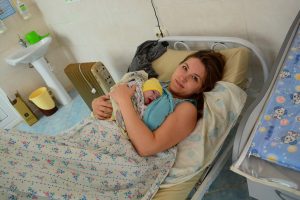
© Pixabay
The stay in a neonatal intensive care unit (NICU) demands a lot from new parents. The physical and emotional separation between the newborn and their parents often creates feelings of helplessness and stress. Family-centred care (FCC) concepts can help to improve the parents’ mental well-being and the infant’s physical health. The FCC intervention enables parents to be with their child at any time and empowers them to care for their newborn. It also involves parents in treatment decisions. The department of neonatology at the Children’s Hospital Passau was one of the first hospitals in Germany to adapt its care practices and routines to follow a FCC concept. The approach shows promising effects for the newborns and their families.
The birth of an infant with very low birth-weight (≤1,500g) (VLBW) often also comes along with health-related risks for the baby and demanding challenges for the parents. The newborn has a higher risk for neurodevelopmental delay, poor growth, and infections. To monitor development, on average, the infant will be treated in a NICU for 53 to 69 days. This, however, means a physical and emotional separation between the parents and the child and tends to result in feelings of helplessness and anxiety for the parents.
Family-centred care includes parents actively in the newborn’s care
To improve the child’s physical state and the parents’ mental condition, the concept of family-centred care (FCC) was introduced. The approach emphasises parental involvement in the care of the newborn by providing information to the parents, training them to take over as many tasks as possible, and involving them in shared decision-making. This improves the quality of care in terms of clinical outcome as well as the parents’ mental well-being.
Positive health effects due to parental involvement
The FCC intervention at the Children’s Hospital Passau had measurably positive effects. The babies included in NeoPAss showed higher growth rates, less cases of broncho-pulmonary dysplasia (BPD), late-onset sepsis (LOS), and lower rates of IVH II-IV (Intraventricular Haemorrhage). The programme also had a positive influence on the lenth of the stay in the NICU and the weight at discharge.
In addition, the study proved that family envolvement does not come along with an increased risk of infection. This is especially important because of the prevalent fear that parents could transmit infections to their newborns. In fact, the presence of families in the NICU had the opposite effect and showed protective effects against LOS. This might be the result of improved communication between healthcare professionals and parents. Moreover, parents were more knowledgeable thanks to the close cooperation with healthcare professionals and the FCC interventions generally. Breastmilk feeding rates also increased, presumable because of better accessibility for parents in the NICU.
In Passau, family-centred care shows an overall positive impact on the infant’s physical health and helps parents to overcome the physical and emotional separation during the newborn’s hospitalisation. The earlier a baby is born, the longer the NICU stay tends to be. In these cases, measures for increased parental involvement become even more necessary and beneficial. Thus, a more widespread implementation of FCC measures in NICUs is encouraged.
Paper available at: Impact of a family-centred clinical care programme on short-term outcomes of very low-birth weight infants
Full list of authors: Rafael Pricoco, Sandra Mayer-Huber, Johannes Paulick, Franz Benstetter, Michael Zeller, Matthias Keller
DOI: https://doi.org/10.1111/apa.16944
Have a look at the ESCNH standards for the core principles of NICU design to promote infant- and family-centred developmental care.

